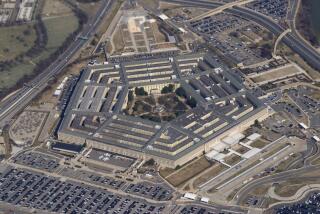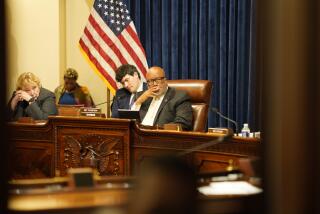Progress Seen in Hunt for Weapons
- Share via
WASHINGTON — A reinvigorated search for Saddam Hussein’s suspected weapons of mass destruction is making “solid progress,” U.S. officials said Thursday, even though no proof has been found in the four months since American troops invaded Iraq.
Over the last six weeks, the officials said, U.S. forces have visited scores of newly identified sites, interviewed or interrogated Iraqi scientists and officials, and recovered hundreds of thousands of documents, computer discs and other potentially useful records.
The officials did not say if the evidence dates to Iraq’s previously documented weapons programs from the 1980s and early 1990s, or if it supports White House claims that Hussein’s regime secretly produced vast new stockpiles of chemical and biological weapons before the war this spring.
“We are making solid progress,” David Kay, a former U.N. weapons inspector who now works as a CIA advisor in Iraq, told reporters after a three-hour, closed-door briefing to the Senate Armed Services Committee.
It was the first report on the work of the 1,400-member Iraq Survey Group, which in June replaced a weapons-hunting operation that was beset by poor intelligence, communication difficulties, inadequate transport and security, competing commands and other problems.
“It is going to take time,” Kay said. “This was a program that over 25 years spent billions of dollars, [had] 10,000 people, was actively shielded by a security and deception plan. So it is not something that is easy to unwrap. But we are in the process.”
A senior member of the team who recently returned from Iraq was less optimistic, however. He said the group “started from scratch” six weeks ago and is largely repeating research and other work that others, including United Nations inspectors, already have done.
The official, who spoke on condition of anonymity, said the team recently was ordered to search more than 100 sites from a list that the Pentagon had compiled before the war.
“It didn’t make any sense,” he said. “Everything had been looted.”
Kay, however, said the Iraq Survey Group is not using “a sterile list drawn up before the war.
“We are being led to these sites by Iraqis and documentation from the Saddam Hussein regime.”
Kay said the documents and collaboration of Iraqis involved in the weapons infrastructure are “leading us to new discoveries every day that further help us understand the full extent and nature of Saddam’s program.”
Kay said that results would not be divulged “on a piecemeal basis” and that he intends to wait until he can satisfy three criteria: multiple Iraqis willing to explain the program, documents that support their claims, and physical evidence.
“We do not want to go forward with partial information that we have to retract later,” he added.
The new group aims to focus more on collecting clues and fresh intelligence about Iraq’s suspected weapons programs rather than simply searching known sites.
Two former U.N. inspectors who have been asked to join the weapons-hunting operation in Iraq were critical of the progress. “They’re still getting going,” one said. “They’re not there yet.”
But U.S. Army Maj. Gen. Keith Dayton, who heads the Iraq Survey Group, was upbeat after he testified to the Senate committee.
“Every week, it is phenomenal what we’re finding, and I am much more optimistic and confident every week that we’re going to come to a very good resolution of this in due time,” Dayton said.
Sen. John W. Warner (R-Va.), the committee chairman, urged Americans to be patient.
“Good, solid progress is being made, but these two leaders of the team are employing a methodology which I support entirely, and that is to have each case thoroughly documented by sound facts and information, whether it’s human information or document interpretation, before going public,” he said.
Kay and Dayton briefed the Senate Intelligence Committee later Thursday.
The failure to find clear proof has raised doubts about the quality of U.S. intelligence and the veracity of senior administration officials. It is likely to become an issue in the 2004 presidential race.
Sen. Bob Graham (D-Fla.), former chairman of the Senate Intelligence Committee and a candidate for the Democratic presidential nomination, said at a news conference that the credibility of the U.S. government both at home and abroad “will be significantly eroded” if no weapons are found.
More to Read
Sign up for Essential California
The most important California stories and recommendations in your inbox every morning.
You may occasionally receive promotional content from the Los Angeles Times.











